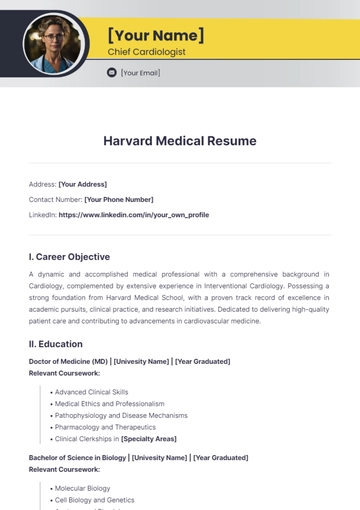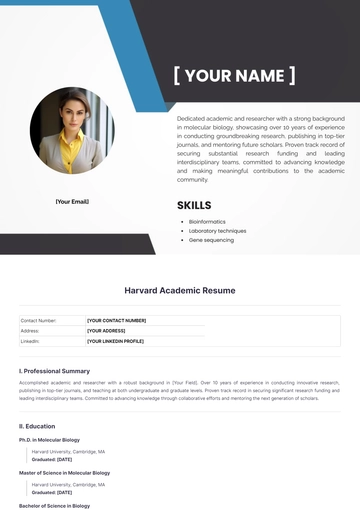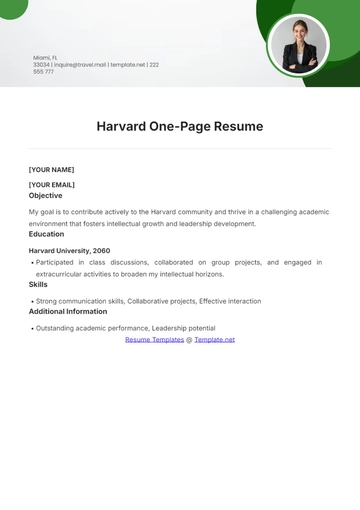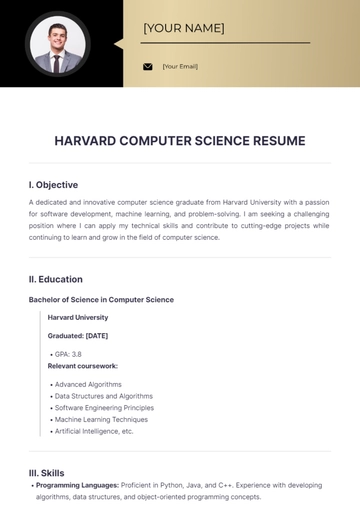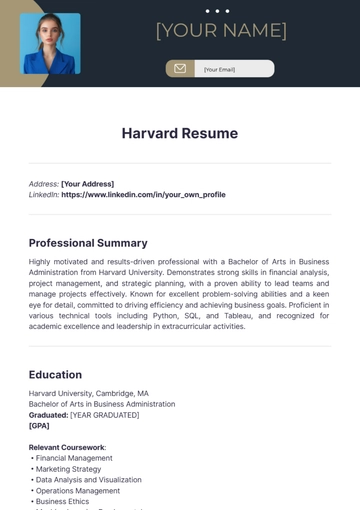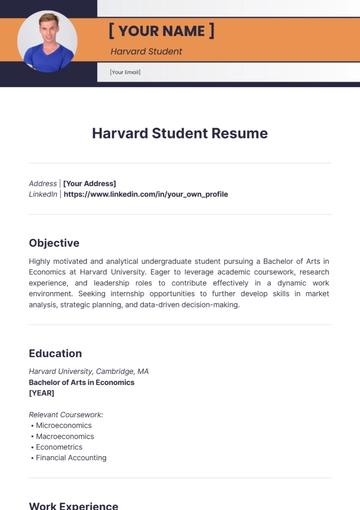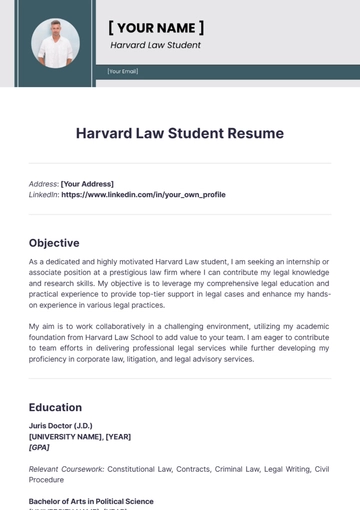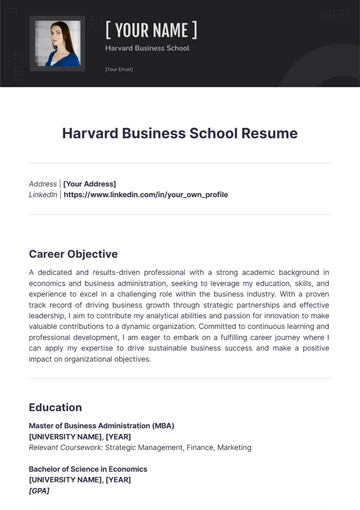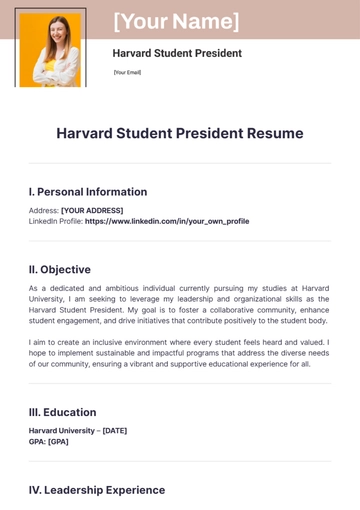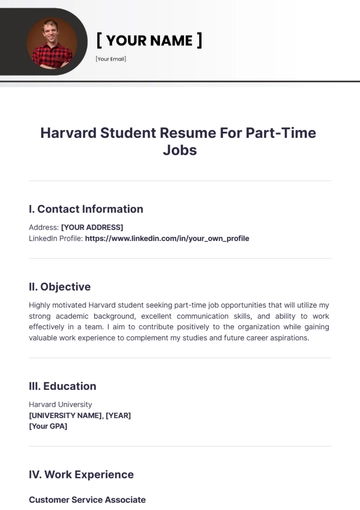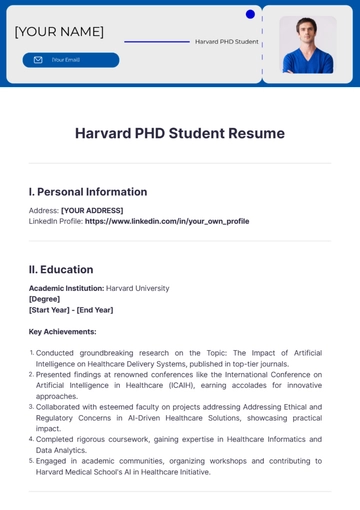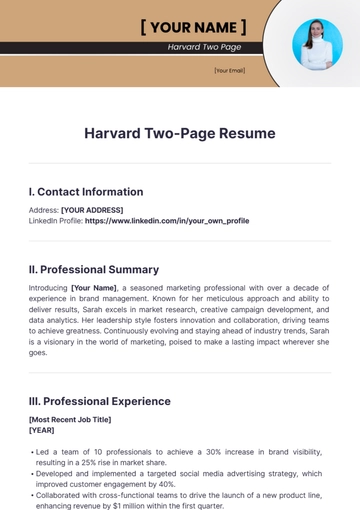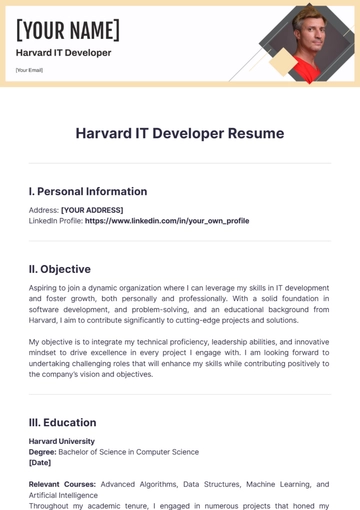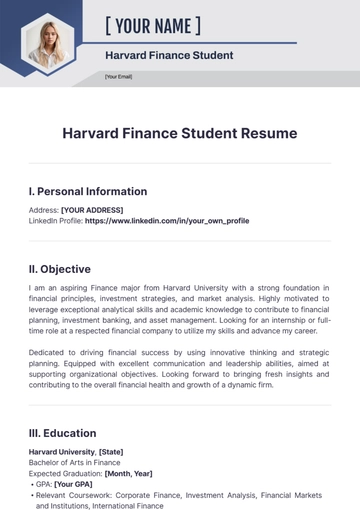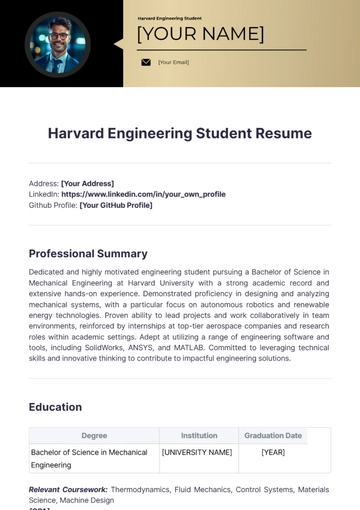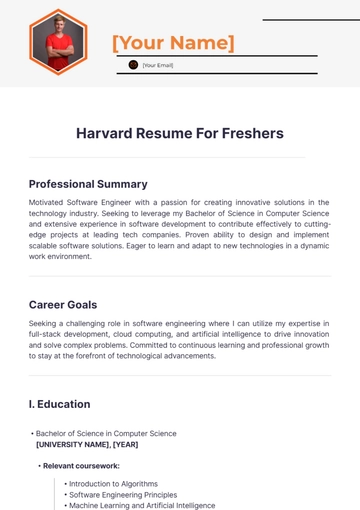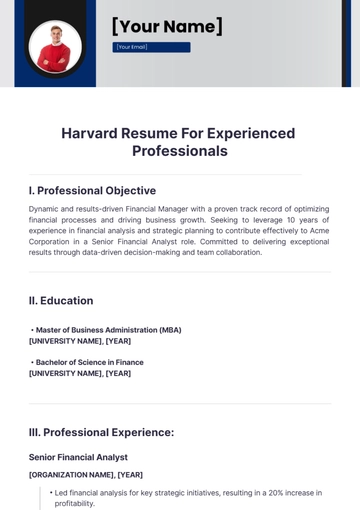Free Harvard Academic Resume
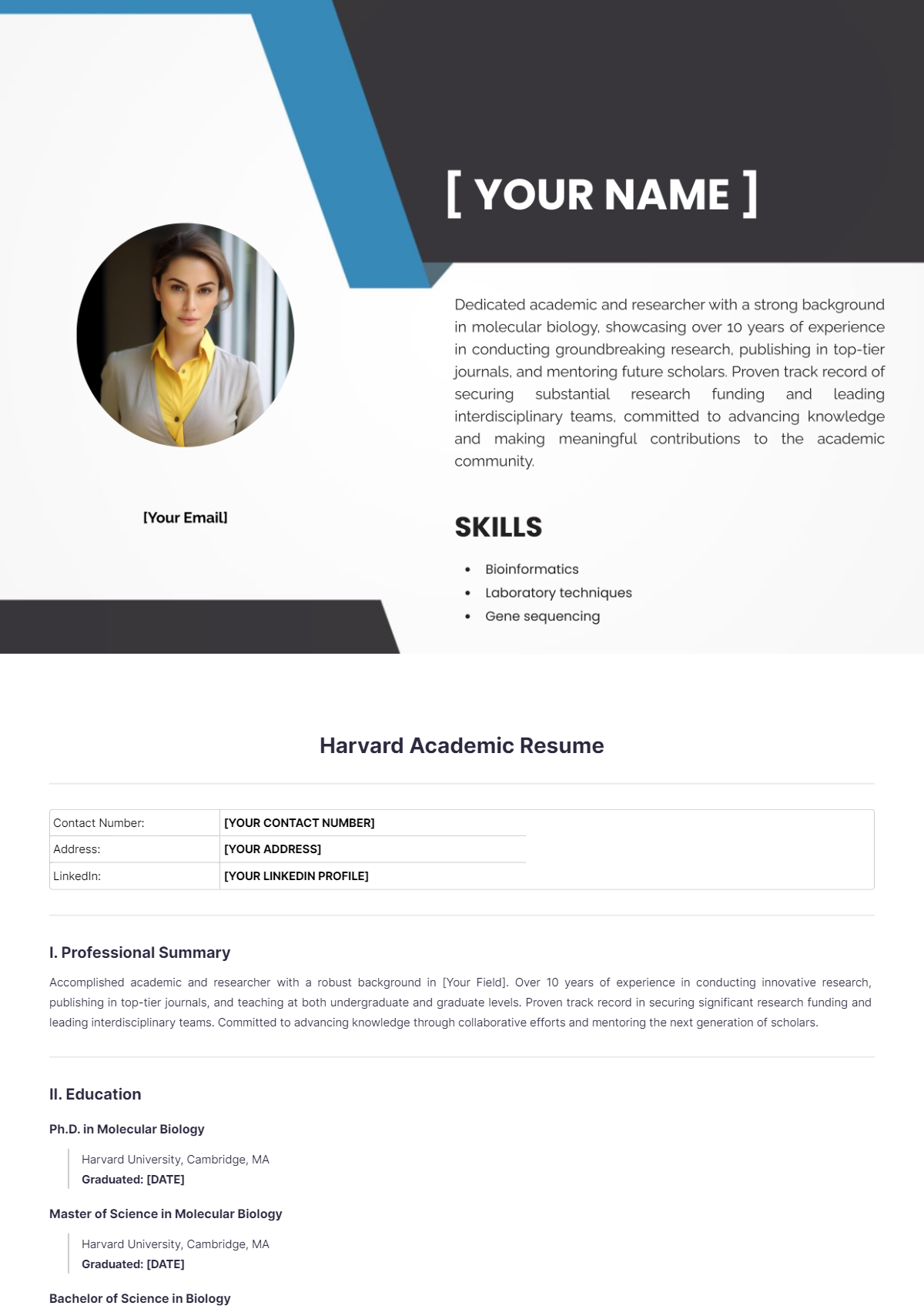
Contact Number: | [YOUR CONTACT NUMBER] |
Address: | [YOUR ADDRESS] |
LinkedIn: | [YOUR LINKEDIN PROFILE] |
I. Professional Summary
Accomplished academic and researcher with a robust background in [Your Field]. Over 10 years of experience in conducting innovative research, publishing in top-tier journals, and teaching at both undergraduate and graduate levels. Proven track record in securing significant research funding and leading interdisciplinary teams. Committed to advancing knowledge through collaborative efforts and mentoring the next generation of scholars.
II. Education
Ph.D. in Molecular Biology
Harvard University, Cambridge, MA
Graduated: [DATE]
Master of Science in Molecular Biology
Harvard University, Cambridge, MA
Graduated: [DATE]
Bachelor of Science in Biology
Harvard University, Cambridge, MA
Graduated: [DATE]
III. Professional Experience
Assistant Professor
MIT, Department of Biology
June 2055 – Present
Conducted research on gene expression regulation, resulting in 5 publications in peer-reviewed journals.
Taught undergraduate and graduate courses in genetics and molecular biology.
Supervised 3 Ph.D. students and mentored 5 undergraduate students in research projects.
Research Fellow
Harvard University, Molecular Biology Laboratory
June 2052 – May 2055
Led research on CRISPR gene-editing technologies, resulting in 4 high-impact publications.
Secured a $500,000 NIH grant for collaborative research on gene therapies.
Presented findings at 7 national and international conferences.
IV. Publications
"CRISPR-Cas9 and its Applications in Gene Therapy", J. Doe, A. Smith, Nature Biotechnology, Vol. 12, pp. 34-56, 2054.
Abstract: This study explores the advancements and applications of CRISPR-Cas9 in treating genetic disorders."Regulation of Gene Expression in Mammalian Cells", J. Doe, B. Johnson, Cell, Vol. 20, pp. 78-90, 2053.
Abstract: This paper investigates the mechanisms of gene regulation in mammalian cells.
V. Research Projects
Gene Editing for Muscular Dystrophy
Role: Principal Investigator
Funding: NIH Grant, $500,000Summary: Developed CRISPR-based techniques to correct mutations causing muscular dystrophy in mouse models.
Epigenetic Modifications in Cancer
Role: Co-Investigator
Funding: NSF Grant, $300,000Summary: Studied the impact of epigenetic changes on cancer progression and potential therapeutic interventions.
VI. Teaching Experience
Advanced Molecular Biology
MIT, Department of Biology
Semester: Fall 2055
Developed curriculum and delivered lectures on advanced molecular biology concepts.
Designed and graded assignments, exams, and research projects.
Received the Outstanding Teaching Award for innovative teaching methods.
Genetics
Harvard University, Department of Biology
Semester: Spring 2054
Taught genetics to undergraduate students, focusing on classical and modern genetics techniques.
Conducted laboratory sessions and supervised student research projects.
VII. Awards and Honors
Outstanding Teaching Award, MIT, 2055.
NIH Research Fellowship, Harvard University, 2053.
NSF Graduate Research Fellowship, Harvard University, 2052.
VIII. Professional Affiliations
Member, American Association for the Advancement of Science (AAAS), 2052 – Present.
Member, Genetics Society of America (GSA), 2053 – Present.
IX. Skills
Technical Skills
CRISPR-Cas9
gene sequencing
bioinformatics
laboratory techniques
Languages
English (Fluent)
Spanish (Conversational)
X. References
Available upon request.
- 100% Customizable, free editor
- Access 1 Million+ Templates, photo’s & graphics
- Download or share as a template
- Click and replace photos, graphics, text, backgrounds
- Resize, crop, AI write & more
- Access advanced editor
Unlock your potential with the Harvard Academic Resume template from Template.net. Tailored for academic excellence, this editable one-page resume showcases your achievements and credentials seamlessly. Crafted to impress, it's the perfect tool for aspiring Harvard scholars and seasoned academics alike. Customize every detail with ease using our AI Editor Tool, ensuring a professional and impactful presentation of your academic journey.
You may also like
- Simple Resume
- High School Resume
- Actor Resume
- Accountant Resume
- Academic Resume
- Corporate Resume
- Infographic Resume
- Sale Resume
- Business Analyst Resume
- Skills Based Resume
- Professional Resume
- ATS Resume
- Summary Resume
- Customer Service Resume
- Software Engineer Resume
- Data Analyst Resume
- Functional Resume
- Project Manager Resume
- Nurse Resume
- Federal Resume
- Server Resume
- Administrative Assistant Resume
- Sales Associate Resume
- CNA Resume
- Bartender Resume
- Graduate Resume
- Engineer Resume
- Data Science Resume
- Warehouse Resume
- Volunteer Resume
- No Experience Resume
- Chronological Resume
- Marketing Resume
- Executive Resume
- Truck Driver Resume
- Cashier Resume
- Resume Format
- Two Page Resume
- Basic Resume
- Manager Resume
- Supervisor Resume
- Director Resume
- Blank Resume
- One Page Resume
- Developer Resume
- Caregiver Resume
- Personal Resume
- Consultant Resume
- Administrator Resume
- Officer Resume
- Medical Resume
- Job Resume
- Technician Resume
- Clerk Resume
- Driver Resume
- Data Entry Resume
- Freelancer Resume
- Operator Resume
- Printable Resume
- Worker Resume
- Student Resume
- Doctor Resume
- Merchandiser Resume
- Architecture Resume
- Photographer Resume
- Chef Resume
- Lawyer Resume
- Secretary Resume
- Customer Support Resume
- Computer Operator Resume
- Programmer Resume
- Pharmacist Resume
- Electrician Resume
- Librarian Resume
- Computer Resume
- IT Resume
- Experience Resume
- Instructor Resume
- Fashion Designer Resume
- Mechanic Resume
- Attendant Resume
- Principal Resume
- Professor Resume
- Safety Resume
- Waitress Resume
- MBA Resume
- Security Guard Resume
- Editor Resume
- Tester Resume
- Auditor Resume
- Writer Resume
- Trainer Resume
- Advertising Resume
- Harvard Resume
- Receptionist Resume
- Buyer Resume
- Physician Resume
- Scientist Resume
- 2 Page Resume
- Therapist Resume
- CEO resume
- General Manager Resume
- Attorney Resume
- Project Coordinator Resume
- Bus Driver Resume
- Cook Resume
- Artist Resume
- Pastor Resume
- Recruiter Resume
- Team Leader Resume
- Apprentice Resume
- Police Resume
- Military Resume
- Personal Trainer Resume
- Contractor Resume
- Dietician Resume
- First Job Resume
- HVAC Resume
- Psychologist Resume
- Public Relations Resume
- Support Specialist Resume
- Computer Technician Resume
- Drafter Resume
- Foreman Resume
- Underwriter Resume
- Photo Resume
- Teacher Resume
- Modern Resume
- Fresher Resume
- Creative Resume
- Internship Resume
- Graphic Designer Resume
- College Resume
